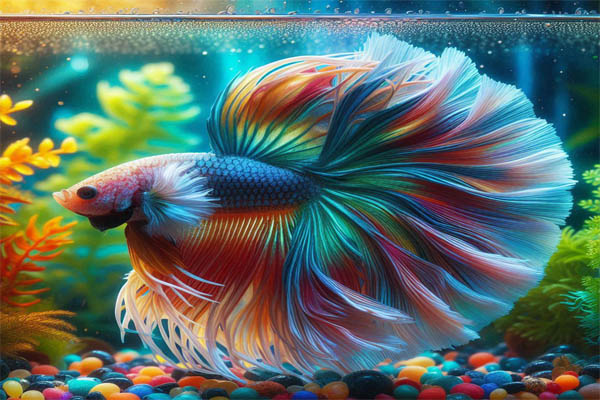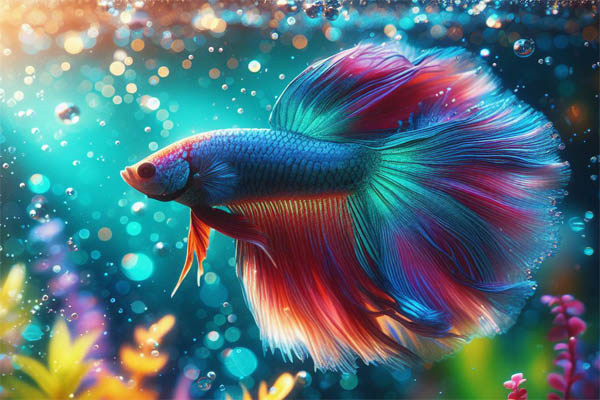The Dazzling World of Betta Fish
Betta fish, also known as Betta splendens and Siamese fighting fish, are renowned for their mesmerizing colors and captivating personalities.
From royal blue to fiery red, these colorful freshwater fish come in a vast array of shades, including green, pink, violet, yellow, turquoise, puple and even light purple.
Their flowing fins, particularly those of male bettas, can be truly beautiful, resembling shapes like halfmoon, veiltail, crowntail, and even double tail.
Some betta fins are so spectacular they seem to defy nature, with varieties like rosetail boasting an almost flower-like form.

Fancy bettas, bred for their stunning looks, come in a seemingly endless variety.
Rare finds like the galaxy betta might boast shimmering scales that seem to reflect a starry night, while the koi betta might possess markings reminiscent of the cool and majestic koi carp.
Popular fin types like plakat (short-finned), peacock, rainbow and halfmoon add to the variety.
Beyond their dazzling colors and flowing fins, betta fish can also be surprisingly interactive.
With proper care in a well-maintained aquarium (at least 5 gallons for a single betta), these curious creatures can become accustomed to their owner’s presence, flaring their fins or following your movements along the tank.
Creating the ideal betta habitat is easy.
Live plants like elephant ear or butterfly varieties not only add beauty but also provide hiding spots and improve water quality.
A varied diet of betta pellets, flakes, and occasional treats like bloodworms will keep your betta fish healthy and vibrant.
So, if you’re looking for a beautiful and relatively low-maintenance pet that injects a pop of color into your home, a betta fish might be the perfect choice.
With their wide range of colors, fin types, and interactive personalities, there’s sure to be a betta fish out there that captures your heart.
Exposing the Colorful Allure of Betta Fish
1.) Origin and Species
- Origin: Southeast Asia, primarily Thailand (formerly Siam)
- Species: Betta splendens (most common pet variety)
- Genus: Betta (over 70 species exist)
- Family: Osphronemidae (gourami family)
2.) Physical Characteristics
- Size: Small fish, typically 2-3 inches long
- Fins: Known for their flowing fins, especially males ( plakat bettas have shorter fins)
- Coloration: Wide variety of vibrant colors, including red, blue, green, yellow, and metallic shades
3.) Behavior
- Temperament: Generally territorial, especially males towards each other. Peaceful with other fish species under the right conditions (larger tank and compatible tank mates).
- Intelligence: Considered relatively intelligent fish, can be trained with patience.
- Lifespan: 2-5 years with proper care
4.) Habitat
- Natural habitat: Shallow, slow-moving waters like rice paddies, canals, and floodplains
- Water: Prefers warm, slightly acidic freshwater (78-82°F)
- Labyrinth organ: Unique organ allowing them to breathe air at the water surface
5.) Care Requirements
- Tank size: Minimum 5 gallons recommended, but larger is better (10+ gallons ideal)
- Filtration: Good quality filter essential for clean water
- Heater: Heater needed to maintain proper water temperature
- Lighting: Moderate lighting, mimicking a natural day/night cycle
- Substrate: Betta-friendly substrate like sand or gravel
- Decorations: Live or silk plants and hiding spots are beneficial
- Diet: Betta fish are carnivores and thrive on a varied diet of betta pellets, flakes, frozen bloodworms, brine shrimp, etc.
- Water changes: Regular water changes (25-50% weekly) are crucial
6.) Additional Entities
- Breeding: Betta fish can be bred in captivity, but it requires specific knowledge and setup.
- Diseases: Betta fish are susceptible to certain diseases like fin rot and ich. Early detection and treatment are essential.
- Betta bowls: While commonly sold, bowls are not ideal for betta fish due to limited space and water quality issues.
Last Words
Contrary to the misconception that betta fish are unintelligent, research underscores their remarkable cognitive abilities. Studies demonstrate that betta fish are capable of learning, remembering, and responding to environmental stimuli.
Their ability to navigate their surroundings and exhibit behaviors like greeting their owners suggests a level of intelligence that positions betta fish as one of the most salient entities in the aquatic world.
Having cared for a betta fish for over two years now, I’ve come to appreciate just how intelligent these creatures can be. Every time I approach the tank, my betta fish swims up eagerly, almost as if greeting me. It’s not just a reflex; it’s a learned behavior that shows he recognizes me and anticipates interaction.
From learning to follow my finger during feeding times to exploring his tank environment, he constantly surprises me with his curiosity and adaptability. It’s clear that my betta fish isn’t just a pet; he’s a smart companion who enriches my daily life with his presence and personality.


